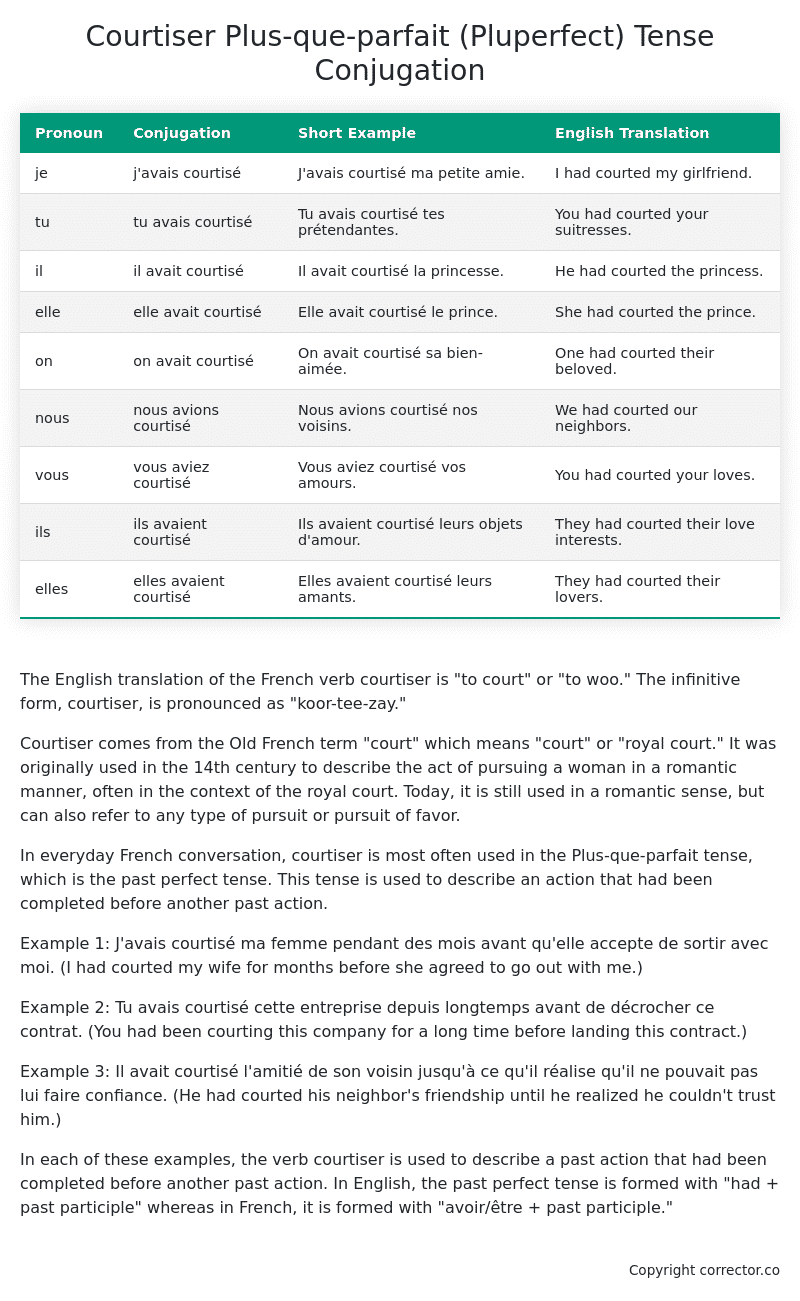Plus-que-parfait (Pluperfect) Tense Conjugation of the French Verb courtiser
Introduction to the verb courtiser
The English translation of the French verb courtiser is “to court” or “to woo.” The infinitive form, courtiser, is pronounced as “koor-tee-zay.”
Courtiser comes from the Old French term “court” which means “court” or “royal court.” It was originally used in the 14th century to describe the act of pursuing a woman in a romantic manner, often in the context of the royal court. Today, it is still used in a romantic sense, but can also refer to any type of pursuit or pursuit of favor.
In everyday French conversation, courtiser is most often used in the Plus-que-parfait tense, which is the past perfect tense. This tense is used to describe an action that had been completed before another past action.
Example 1: J’avais courtisé ma femme pendant des mois avant qu’elle accepte de sortir avec moi. (I had courted my wife for months before she agreed to go out with me.)
Example 2: Tu avais courtisé cette entreprise depuis longtemps avant de décrocher ce contrat. (You had been courting this company for a long time before landing this contract.)
Example 3: Il avait courtisé l’amitié de son voisin jusqu’à ce qu’il réalise qu’il ne pouvait pas lui faire confiance. (He had courted his neighbor’s friendship until he realized he couldn’t trust him.)
In each of these examples, the verb courtiser is used to describe a past action that had been completed before another past action. In English, the past perfect tense is formed with “had + past participle” whereas in French, it is formed with “avoir/être + past participle.”
Table of the Plus-que-parfait (Pluperfect) Tense Conjugation of courtiser
| Pronoun | Conjugation | Short Example | English Translation |
|---|---|---|---|
| je | j’avais courtisé | J’avais courtisé ma petite amie. | I had courted my girlfriend. |
| tu | tu avais courtisé | Tu avais courtisé tes prétendantes. | You had courted your suitresses. |
| il | il avait courtisé | Il avait courtisé la princesse. | He had courted the princess. |
| elle | elle avait courtisé | Elle avait courtisé le prince. | She had courted the prince. |
| on | on avait courtisé | On avait courtisé sa bien-aimée. | One had courted their beloved. |
| nous | nous avions courtisé | Nous avions courtisé nos voisins. | We had courted our neighbors. |
| vous | vous aviez courtisé | Vous aviez courtisé vos amours. | You had courted your loves. |
| ils | ils avaient courtisé | Ils avaient courtisé leurs objets d’amour. | They had courted their love interests. |
| elles | elles avaient courtisé | Elles avaient courtisé leurs amants. | They had courted their lovers. |
Other Conjugations for Courtiser.
Le Present (Present Tense) Conjugation of the French Verb courtiser
Imparfait (Imperfect) Tense Conjugation of the French Verb courtiser
Passé Simple (Simple Past) Tense Conjugation of the French Verb courtiser
Passé Composé (Present Perfect) Tense Conjugation of the French Verb courtiser
Futur Simple (Simple Future) Tense Conjugation of the French Verb courtiser
Futur Proche (Near Future) Tense Conjugation of the French Verb courtiser
Plus-que-parfait (Pluperfect) Tense Conjugation of the French Verb courtiser (this article)
Passé Antérieur (Past Anterior) Tense Conjugation of the French Verb courtiser
Futur Antérieur (Future Anterior) Tense Conjugation of the French Verb courtiser
Subjonctif Présent (Subjunctive Present) Tense Conjugation of the French Verb courtiser
Subjonctif Passé (Subjunctive Past) Tense Conjugation of the French Verb courtiser
Subjonctif Imparfait (Subjunctive Imperfect) Tense Conjugation of the French Verb courtiser
Subjonctif Plus-que-parfait (Subjunctive Pluperfect) Tense Conjugation of the French Verb courtiser
Conditionnel Présent (Conditional Present) Tense Conjugation of the French Verb courtiser
Conditionnel Passé (Conditional Past) Tense Conjugation of the French Verb courtiser
L’impératif Présent (Imperative Present) Tense Conjugation of the French Verb courtiser
L’infinitif Présent (Infinitive Present) Tense Conjugation of the French Verb courtiser
Struggling with French verbs or the language in general? Why not use our free French Grammar Checker – no registration required!
Get a FREE Download Study Sheet of this Conjugation 🔥
Simply right click the image below, click “save image” and get your free reference for the courtiser Plus-que-parfait tense conjugation!

Courtiser – About the French Plus-que-parfait (Pluperfect) Tense
Tense Formation
Common everyday usage patterns
Sequencing of past events
Background information
Hypothetical or reported speech
Interactions with other tenses
Summary
I hope you enjoyed this article on the verb courtiser. Still in a learning mood? Check out another TOTALLY random French verb conjugation!


